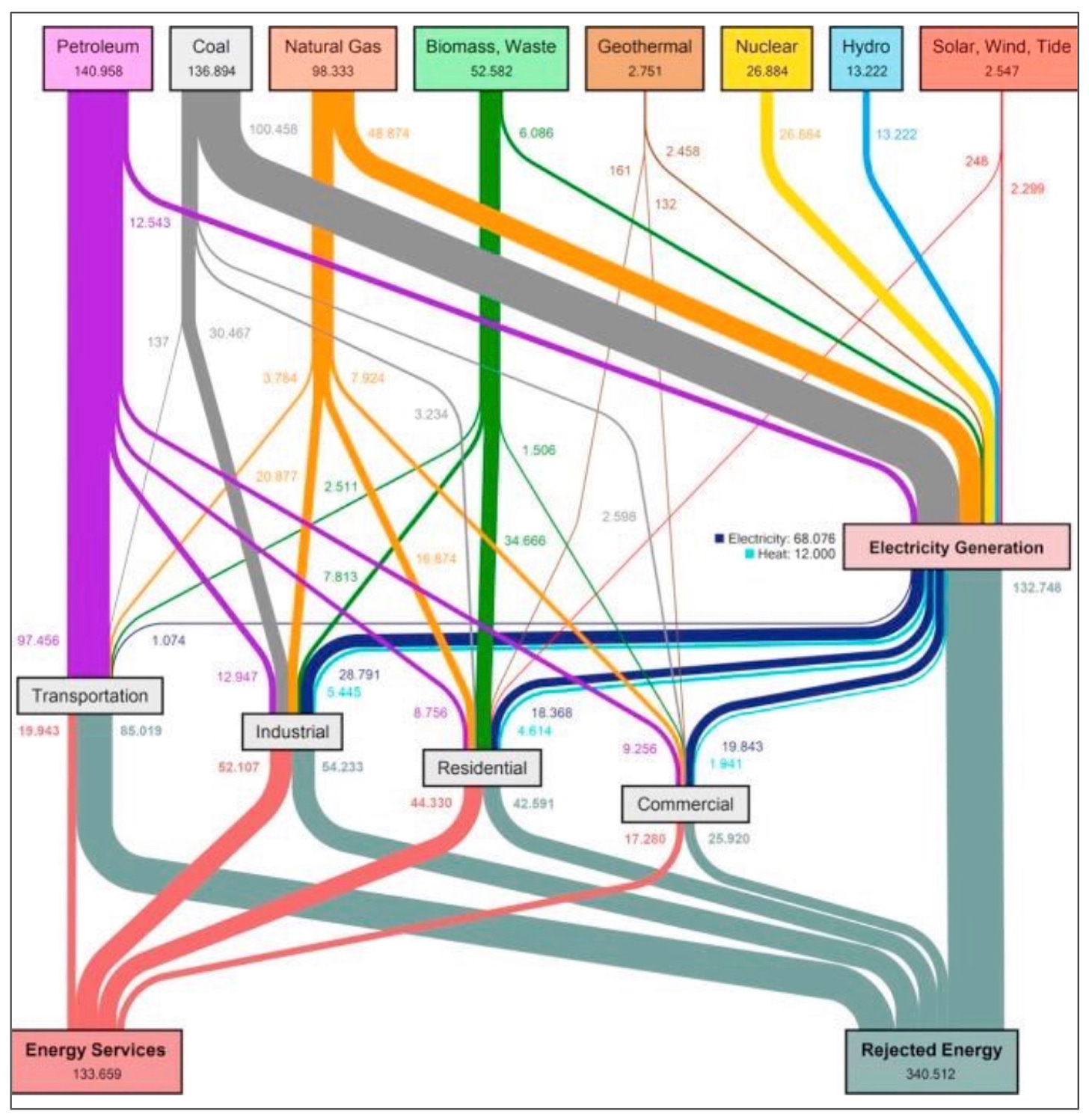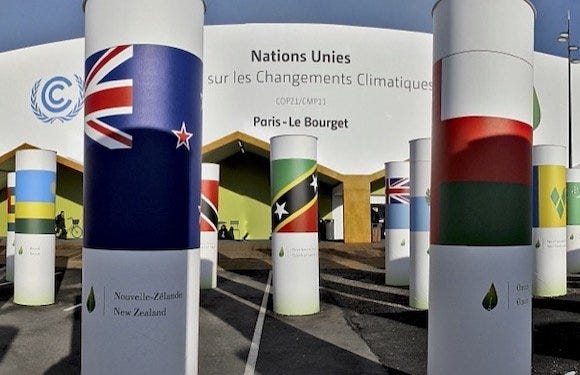‘Hopeless, Broken’ Climate Scientists Deliver a Call to Action for Everyone (Encore Edition)
Global heating has brought us to an alarming moment, and climate scientists are doing their jobs by saying so. Doubling and tripling down, not giving up, is the only way to respond.
This mid-May post was one of our most widely-read ever. It connects powerfully to the United Nations Emissions Gap Report published October 24—for the grief and rage it captured from climate scientists, and for the call to action in the post. As former UN climate secretary Christiana Figueres said at the time, giving up in despair is exactly the wrong conclusion to draw from what the scientists are seeing, hearing, and saying.
May 12, 2024 — Climate scientists poured out their hopelessness and grief this week, and it’s important that everyone listen closely. And then do more than just mirror back their despair. For the scientists, and for the rest of us, everything depends on how we build their latest dire warning into the momentum we need to win.
The news that many of the world’s top climate researchers are left “hopeless and broken” by their work comes from an exhaustive survey of the scientific minds behind the planet’s most authoritative source on global heating, the Intergovernmental Panel on Climate Change (IPCC). The Guardian approached the 843 “contactable” lead authors and review editors involved with IPCC reports dating back to 2018.
Nearly half of them, 380, answered the call. Many of them “envisage a ‘semi-dystopian’ future, with famines, conflicts, and mass migration, driven by heatwaves, wildfires, floods, and storms of an intensity and frequency far beyond those that have already struck,” Guardian environment editor Damian Carrington reports.
• Just under 6% of the scientists believe countries will meet the internationally-agreed goal of holding average global warming to 1.5°C. Another 18% place the threshold at 2°.
• 77% expect a temperature increase of at least 2.5°C.
• 61% foresee a rise of 2.5 or 3°C.
• 15% predict an increase between 3.5 and 5°C.
“The 1.5°C target was chosen to prevent the worst of the climate crisis and has been seen as an important guiding star for international negotiations,” Carrington recalls. “Current climate policies mean the world is on track for about 2.7°C, and the Guardian survey shows few IPCC experts expect the world to deliver the huge action required to reduce that.”
Reasons for Alarm, Rays of Hope
The scientists, and the Guardian, have every good reason to raise the alarm.
Fossil companies are speeding up their search for new oil and gas deposits and walking back their already greenwashed emission reduction targets.
The latest round of corporate annual meetings in May saw fossil and financial industry shareholders consistently defeating reasoned demands that they disclose their emissions and tell the world how they plan to reduce them.
Negotiations toward a global plastics treaty in late April ended in a “weak compromise”, which may yet turn out to be polite COP-speak for total failure. Largely because the meeting was overrun by plastic and fossil fuel lobbyists who see their industries’ future markets threatened by any real momentum to reduce a global avalanche of plastic production and pollution, rather than just managing it better and letting the petroleum supply chains keep flowing.
Analysts at S&P Global say Canadian oil sands production is on track to grow 15% by 2030, Reuters reports, and some fossil industry analysts are already floating a trial balloon about the country needing to build another oil pipeline—because the dangerous, shoddily-regulated, ridiculously over-budget Trans Mountain expansion megaproject won’t be enough to meet the future demand they casually and misleadingly project. Even with much of Canada in an alarming, long-term drought, and the western provinces now exploding into another gut-wrenching wildfire season.
But we’ve seen it consistently in the full decade(!) that The Energy Mix has now been publishing: the bad and the scary news almost always runs alongside the increasingly powerful rays of hope. So over a span of just 10 days in May, while the IPCC scientists were answering the Guardian survey, we were learning that:
• Solar and wind have hit a turning point where they now supply 30% of the world’s electricity and have begun elbowing fossil fuels off the grid.
• Ontario fell about one-third short in its bid to add 1,500 megawatts of new gas plants to the provincial grid, but ended up celebrating after averting the rest of its projected power shortage with battery storage.
• Battery storage world-wide was “changing the game before our eyes”, though deployment still needs to ramp up fast to meet global climate targets.
• The Ulkatcho First Nation of Anahim Lake in British Columbia was planning to reduce its reliance on unhealthy, carbon-emitting diesel by 70% by building Canada’s biggest off-grid solar farm.
• Deep energy retrofits in an Alberta pilot project reduced home energy use by 58 to 93%.
• Toronto’s Brookfield Asset Management signed a massive deal with Microsoft to supply it with a record 10.5 gigawatts of renewable electricity.
• New York State is getting back into offshore wind development.
• An ingenious U.S. startup is looking to combine electric vehicle chargers with street lamps—they’re already wired up and ready to go—for the large proportion of drivers who need on-street parking and charging.
• Discouraging news for the carbon capture and storage industry delivered some badly-needed clarity for the rest of us as one major project in Alberta failed and a second one received scathing reviews for falling short of its capture targets.
• London, UK Mayor Sadiq Khan won an historic third term of office and pledged to double down on climate solutions.
The oldest of those stories was dated May 2. And they’re just a small fraction of the news, good and bad, that crossed our desks over that time. A list of happy news headlines can only begin to outweigh the horrific impacts climate scientists are reporting or the grinding anxiety that so many of us walk around with every day. But, crucially, they are the beginning: they point us to the most practical, promising solutions and give us the pathways we need to get more done faster.
Angry, Sad, But No Surprise
All of which makes the scientists’ comments to the Guardian that much more maddening—because we know this didn’t have to be the story. And yet, I have to confess: when I first saw the Guardian report I was angry, sad, frustrated as always at the malpractice, malfeasance, and unforced errors we report on every day—but not even slightly shocked or surprised.
As Carrington points out, 2.5 or 3°C average warming is in line with the 2.7°C analysts projected from the latest round of national commitments under the 2015 Paris agreement. Countries haven’t been keeping those promises, and now many of the world’s biggest corporate polluters are backsliding on their commitments, too.
The scientists are reading the same bad news. So their feeling of being hopeless and broken isn’t solely about new scientific data. It’s also coming from the experience of repeatedly gathering the evidence, doing the math, reaching diligent, science-based conclusions…then consistently being shut down and let down by the government and corporate decision-makers who have the power to do anything about it.
With the IPCC’s most recent assessment report last year, “the big difference was that all of the scientists I worked with were incredibly frustrated,” climate change and biodiversity specialist Camille Parmesan of France’s Centre national de la recherche scientifique told the Guardian. “Everyone was at the end of their rope, asking: what the fuck do we have to do to get through to people how bad this really is?”
“We did our science, we put this really good report together and—wow—it really didn’t make a difference on the policy,” said Lisa Schipper, a research fellow at the Stockholm Environment Institute. “It’s very difficult to see that, every time.”
Which brings us to one more news story in the first half of May that showed us where a change in attitude, policy, and practice is most urgently needed. By allowing “political headwinds” to slow the global energy transition, big institutional investors are setting up the Earth and its inhabitants for a devastating future of 3°C average warming, the respected Wood Mackenzie energy analytics firm concluded.
WoodMac based its projection on global energy transition spending averaging $1.7 trillion per year, 55% less than the amount required to hit the targets in the Paris deal—and on the political realignments we may see as half of the global population heads to the polls in 2024 (Mayor Khan’s blowout win in London notwithstanding).
So we end up in the same place: nearly three-quarters of the IPCC scientists pinpointed the lack of political will to explain the world’s sluggish response to the colossal danger we face.
This Is Where We Are
This isn’t where we should be, nearly a decade after the Paris climate conference and more than 35 years after Canada jump-started global climate diplomacy as host of the Toronto Conference on the Changing Atmosphere.
But this is where we are. Stopping and someday reversing climate change begins with getting a rampaging global fossil fuel industry under control, but after that it extends into every industry, community, and household, across Canada and around the world.
So even though it’s alarming to see such an uneven, confused response, it’s also entirely predictable, particularly given the size and weight of the vested interests we’re up against. The perpetrators in fossil fuels, finance, plastics, industrial agriculture, and more are among the most powerful lobbying and financial powerhouses the world has ever seen. They have lots of money to spin greenwashed climate solutions while financing climate delay and misinformation, and as we saw with the #ExxonKnew scandal among so many others, they aren’t shy about spending it.
So it isn’t surprising that we’re having some bad moments. Really, what’s surprising is that we still have a practical, realistic path to the climate solutions we need.
Imagine if it were a fair fight.
Imagine if every business, government, and international agency that claimed to be making best efforts were actually delivering on the promise.
A day after the Guardian reported on its scientists’ survey, Christiana Figueres weighed in with a response. Figueres, one of the architects of the Paris accord, was UN climate secretary from 2010 to 2017 and now co-produces the excellent Outrage + Optimism podcast. In her post, she stressed that the overwhelming response to the survey “isn’t scaremongering: these climate scientists are doing their job. They are telling us where we are, but now it’s up to the rest of us to decide what this moment requires of us and to radically change the direction of travel.”
Figueres stressed that giving up in despair is exactly the wrong conclusion to draw from what the scientists are saying (with emphasis added):
Collective doubt in our ability to respond to the climate crisis is by now dangerously pervasive. Beyond climate scientists, it’s shared by politicians and some young people. It’s also shared by some philanthropists who fund climate NGOs, and by many who work in those NGOs. It is shared by some financiers, and some of those who work in companies struggling to reduce their emissions.
A sense of despair is understandable, but it robs us of our agency, makes us vulnerable to mis- and disinformation, and prevents the radical collaboration we need. Doubt holds us back from taking bold action, which is why it is strategically seized upon by incumbents, who have invested millions of dollars (probably much more) in sowing uncertainty around the climate crisis and its solutions among the general public.
We all have a right to grieve the loss of a future free from the climate crisis. It is a deep, hard loss. And it’s particularly painful, because those of us who read these reports bear a great responsibility in passing an unsafe planet on to our children and future generations. But grief that stops at despair is an ending that I and many others, most notably those on the frontlines, are not prepared to accept.
We also have the responsibility—and the opportunity—to shape the future differently. We must take stock of the science, triple down on our efforts, and deploy the perspective of possibility.
No one said this was going to be easy, and there are hours and days when it’s excruciatingly hard. But this is what we’ve signed on for—voluntarily, if any part of our work has anything to do with climate change and climate solutions, or involuntarily, by being a living, breathing part of the human family at this time in history. We don’t pay attention to climate change because we’re guaranteed to succeed, but because as Figueres says, we can still get this done if we triple down on what’s possible. And, with her reference to people on the frontlines of the crisis—because many of us don’t have the choice, and therefore the rest of us don’t have the right, to just give up.
All of which makes the Guardian survey and the scientists’ response a deeply heroic moment. As long as we all take away the right conclusion from their alarm.
Mitchell Beer traces his background in renewable energy and energy efficiency back to 1977, in climate change to 1997. Now he and the rest of the Energy Mix team scan 1,200 news headlines a week to pull together The Energy Mix, The Energy Mix Weekender, and our weekly feature digests, Cities & Communities and Heat & Power.
Chart of the Week

Record Global Emissions Put Warming on Track for ‘Catastrophic’ 2.6-3.1°C, UN Warns
Hydrogen Projects Delayed, Cancelled as ‘Hype’ Meets Reality
‘You Couldn’t Make This Up’: Ontario is No Model for Climate and Energy, Winfield Warns Australia
Underground Leak at U.S. CCS Well Could Bode Badly for Northern Alberta
New Partnership Brings Geoexchange Heating to Ontario Condos
2024 Climate Report Signals Escalating Crisis Amid Record Heat, Failing Ecosystems
New Energy Transition Course Pitches Alternative to ‘Oil and Gas Forever World View’
Uncertainty Hobbles Industry in Race to Net-Zero
Chinese Manufacturer Unveils 26-MW Offshore Turbine, World’s Biggest
Big Oil pays big bucks for private meeting with Poilievre (Hamilton Spectator)
Canadian sustainability board close to issuing first climate disclosure rules (Globe and Mail)
NYC comptroller Lander to end private market fossil fuel investments (Reuters)
Global Forest Fire Carbon Emissions Have Jumped 60% in 20 Years (Bloomberg)
Hurricanes Helene, Milton upended a key part of the U.S. agriculture system (Grist)
Businesses get a boost from EV chargers nearby (Canadian Broadcasting Corporation)
Maxeon’s world-leading solar tech faces hard road ahead (Canary Media)
Russia’s Warming Arctic Is a Climate Threat. War Has Shut Scientists Out of It. (New York Times)
China's Q3 economic losses from natural calamities surge (Reuters)
The Climate Scientist Who Leads Mexico Is Betting on Decades of Fossil Fuel (Bloomberg)
How the World Bank and IMF can truly drive a clean energy transition (African Arguments)
Cuba's power grid suffers yet another collapse as Hurricane Oscar makes landfall (Canadian Broadcasting Corporation)






